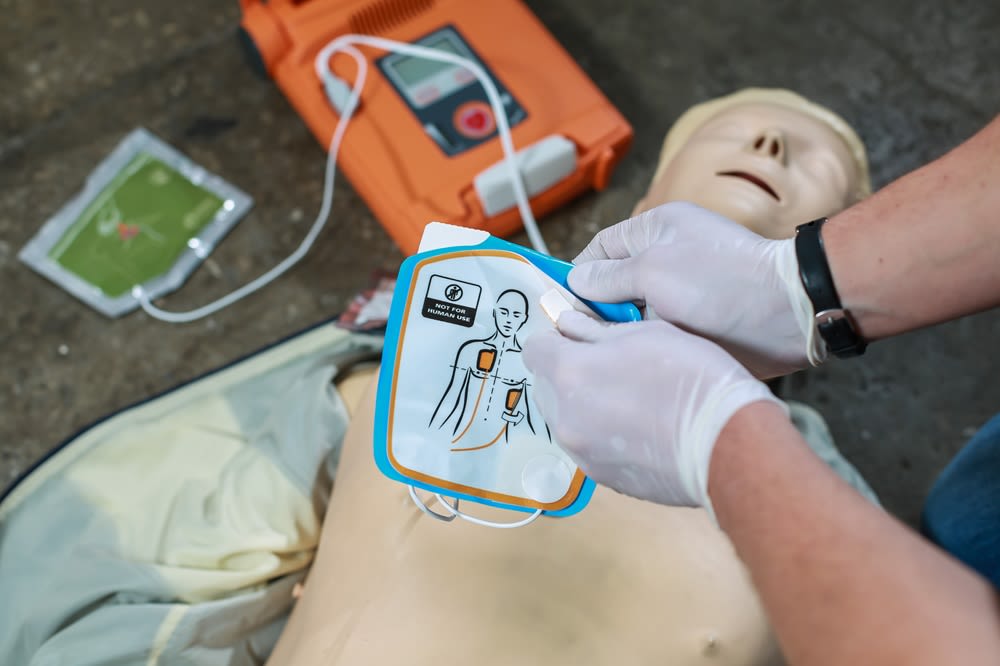
An automated external defibrillator (AED) could be an important part of your business environment. In fact, depending on the type of business you run and your location, you could have AED requirements for businesses that you must meet to stay open.
Here’s what you need to know about what AEDs are and the rules and regulations that might apply. Take care to ensure you meet these requirements to ensure your business stays compliant.
What Is an AED?
An automated external defibrillator (AED) is a medical device that can shock the heart into normal rhythm after a cardiac event. Most come with detailed instructions about how to use them, and some can speak instructions bystanders can follow in a crisis.
As heart disease is a major killer of people all across the United States, these devices are considered critical in most workplaces. By installing one, you could keep your employees, visitors, and vendors safer.
What Are Federal AED Requirements for Business?
Some federal laws apply to the purchase of placement of AEDs in public places, such as businesses. Understanding what they are could help you determine if you need one in your location.
According to the Sudden Cardiac Arrest Foundation, these federal laws may apply to businesses:
Aviation Medical Assistance Act: These regulations apply to airports and passenger aircraft (like airplanes).
Cardiac Arrest Survival Act: These regulations apply to federal buildings and include protections for people who are authorized to use AEDs.
Community Access to Emergency Devices Act: These regulations apply to public spaces, and they involve training first responders.
It’s important to recognize that these are federal laws, not state versions. Your state may augment these plans with more stringent rules, but a state’s version can’t override a federal one.
What Are Common State AED Requirements for Business?
Just as the federal government has laws about AEDs and who needs them, so do the states. Those local regulations can vary dramatically, but some common threads connect them.
The American Heart Association explains that all states include AEDs in their Good Samaritan laws. In other words, all states have protections for people who use the devices to help someone in need. As a business owner, you can install these items and feel reasonably certain that no lawsuits will result.
Additionally, close to 40 states have laws involving AED placements. Of them, states require AED in locations such as the following:
Schools
Athletic facilities
Health facilities
Gyms and other fitness sites
State-owned facilities
Gambling venues
Public golf courses
States may enact these sorts of regulations based on guidance from local emergency medical services, public health experts, and others. When determining where AEDs should be placed, they may consider factors such as the distance to a local hospital or medical facility.
Are There Other AED Requirements?
State and federal laws can influence when and where you place an AED, but those aren’t the only regulations you should know about. For example, you may have rules from the Occupational Safety and Health Administration (OSHA).
While OSHA regulations don’t address AEDs specifically, some standards involving first-aid hazards can cover these devices. Business owners dealing in the following industries or with the following hazards may need AEDs per OSHA:
Maritime applications
Construction
Medical services
Places with potential bloodborne pathogens
Your OSHA compliance manager can help you understand your specific business application and whether a device is a necessity for you. Since the regulations can be a bit difficult to parse, it’s worth it to get some expert guidance.
What Should You Do to Implement an AED Program?
The American Heart Association recommends that business owners research their state requirements for AED programs. That research is especially important, as some locations have rules about reporting for AEDs.
Tools like this one can help you understand the legislative landscape in your state. Your facility’s medical officer can also help you research AEDs and whether or not you should have one within your facility.
It’s also critical to find a partner that can help you set up an AED and maintain it. These sensitive devices require routine maintenance to stay in tip-top shape. You may need an expert to help you with this step. A first aid kit service company could help.
Do AED Requirements for Business Work?
Rules and regulations exist to ensure that AEDs are available during a crisis when minutes matter. While those codes should help people get the assistance they need, the evidence suggests that they don’t always help.
In one study published by the American Heart Association, researchers found that bystanders in states with AED laws only used the devices 19% of the time. In other words, while businesses were required to put the items in, people rarely used them.
If you invest in an AED for your business, ensure that you train your employees and that they know what to do during a crisis. That instruction will confirm that your investment pays off, and the training could end up saving someone’s life.
Alsco Uniforms Can Help With AEDs
Whether you’re required to install an AED or you just want one to protect your staff, Alsco Uniforms can help. Our health, safety, and facility services mean you have the devices you need for your staff to use in a crisis. And we’ll perform routine maintenance, so everything works as it should when it’s needed. Reach out to us today to learn more about how we can support your business.
References
CPR and AED Laws. Sudden Cardiac Arrest Foundation.
AED Automated External Defibrillator. (April 2018). American Heart Association.
AED Requirements by State 2024. World Population Review.
Public Access Defibrillation (PAD) Fact Sheet. (May 2024) Centers for Disease Control and Prevention.
Automated External Defibrillators (AEDs). Occupational Safety and Health Administration.
10 Steps to an Effective AED Program. (2023). American Heart Association.
Abstract 340: Automated External Defibrillator Utilization After Out-of-Hospital Cardiac Arrest at Recreational Facilities in the United States. (November 2023). Circulation.
